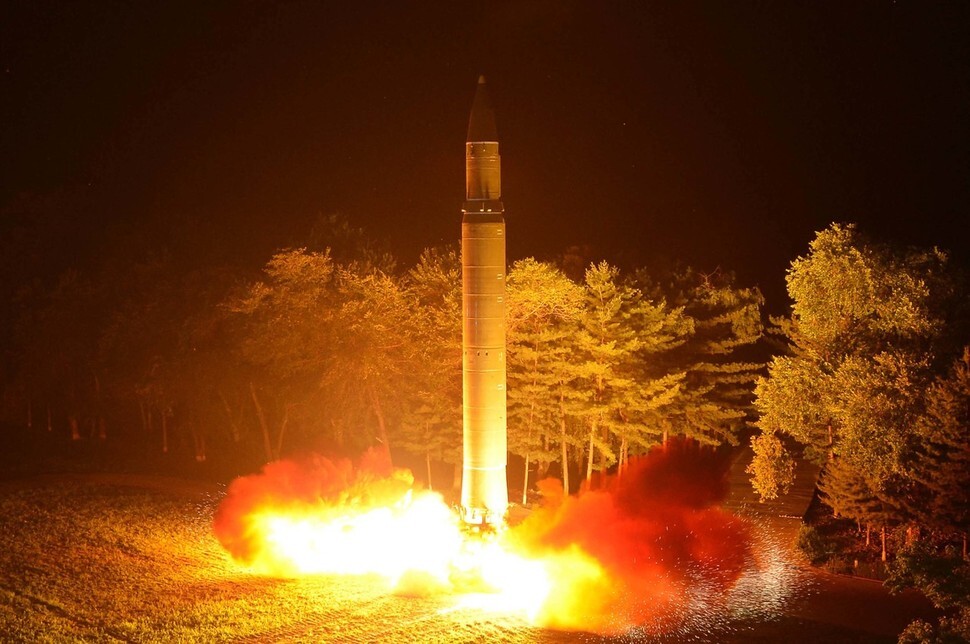hankyoreh
Links to other country sites 다른 나라 사이트 링크
The US claim that North Korea has 60 nukes is a “dangerous exaggeration,” a nuclear expert says

A US intelligence agency concluded last month that North Korea has succeeded in developing a miniaturized nuclear warhead that can be loaded on an ICBM, reports say. Officials in South Korea and the US reportedly also estimate that North Korea currently has an arsenal of 60 nuclear weapons. But some experts believe such estimates are exaggerated.
On Aug. 8, the Washington Post reported that the Defense Intelligence Agency (DIA), which reports to the Pentagon, concluded in a classified assessment of North Korea’s nuclear program last month that the North had developed nuclear weapons that can be carried by its ballistic missile delivery systems, including ICBMs. It is not known whether North Korea has successfully tested its miniaturized nuclear warheads, the newspaper said.
In the same report, which is dated July 28, the DIA estimated that North Korea possesses as many as 60 nuclear weapons. This is significantly higher than an estimate made by Siegfried Hecker, who is regarded as one of the US’s leading nuclear experts. In an article published on North Korean affairs website 38 North in Sept. 2016, Hecker said that North Korea has “a stockpile of sufficient fissile material for approximately 20 bombs by the end of this year [2016].” And in April 2017, David Albright, president of the Institute for Science and International Security (ISIS), estimated that North Korea had 30 nuclear weapons by the end of 2016.
“The new assessment,” the Washington Post reported, “concludes that this critical milestone has been reached [. . .] crossing a key threshold on the path to becoming a full-fledged nuclear power.”
But Hecker was critical of the assessment in the report, telling the Washington Post that “Overselling is particularly dangerous.” “I don’t believe they have sufficient missile or nuclear test experience to field a nuclear warhead that is sufficiently small, light and robust to survive an ICBM delivery,” Hecker told AFP, arguing that it would take five more years for North Korea to acquire an “adequately robust reentry vehicle.”
It’s not yet clear what effect this intelligence assessment will have on US President Donald Trump’s policy toward North Korea. “The options said to be under discussion range from new multilateral negotiations to reintroducing US battlefield nuclear weapons to the Korean Peninsula,” the Washington Post reported. This suggests that the Trump administration’s North Korea policy could be subject to a considerable amount of revision.
Since the assessment coincides with recent reports about the possibility of North Korea deploying operational ICBMs next year, some think it was leaked deliberately to pave the way for justifying military action against North Korea. The US media have reported that Trump’s remarks about “fire and fury,” which he made after encountering the Washington Post’s story on the intelligence assessment, may have been borrowed from what President Harry Truman said in 1945 immediately after an atomic bomb was dropped on the Japanese city of Hiroshima. Warning of even worse destruction to come, Truman told the Japanese to “expect a rain of ruin from the air, the like of which has never been seen on this earth.”
But it’s still widely thought that the Trump administration is unlikely to attempt military action against North Korea. The president cannot decide to start a war on his own; doing so without the approval of Congress or allies such as South Korea would have enormous consequences; and it would be impossible to preemptively eliminate all of North Korea’s capacity to retaliate.
When asked about the Washington Post report, a South Korean military official held to the current intelligence assessment that “South Korean and American intelligence agencies believe that North Korea has made considerable progress on miniaturizing nuclear warheads.”
By Yi Yong-in, Washington correspondent
Please direct questions or comments to [english@hani.co.kr]

Editorial・opinion
![[Column] Season 2 of special prosecutor probe may be coming to Korea soon [Column] Season 2 of special prosecutor probe may be coming to Korea soon](https://flexible.img.hani.co.kr/flexible/normal/500/300/imgdb/original/2024/0426/3317141030699447.jpg) [Column] Season 2 of special prosecutor probe may be coming to Korea soon
[Column] Season 2 of special prosecutor probe may be coming to Korea soon![[Column] Park Geun-hye déjà vu in Yoon Suk-yeol [Column] Park Geun-hye déjà vu in Yoon Suk-yeol](https://flexible.img.hani.co.kr/flexible/normal/500/300/imgdb/original/2024/0424/651713945113788.jpg) [Column] Park Geun-hye déjà vu in Yoon Suk-yeol
[Column] Park Geun-hye déjà vu in Yoon Suk-yeol- [Editorial] New weight of N. Korea’s nuclear threats makes dialogue all the more urgent
- [Guest essay] The real reason Korea’s new right wants to dub Rhee a founding father
- [Column] ‘Choson’: Is it time we start referring to N. Korea in its own terms?
- [Editorial] Japan’s rewriting of history with Korea has gone too far
- [Column] The president’s questionable capacity for dialogue
- [Column] Are chaebol firms just pizza pies for families to divvy up as they please?
- [Column] Has Korea, too, crossed the Rubicon on China?
- [Correspondent’s column] In Japan’s alliance with US, echoes of its past alliances with UK
Most viewed articles
- 1No good, very bad game for Korea puts it out of Olympics for first time since 1988
- 2[Column] Season 2 of special prosecutor probe may be coming to Korea soon
- 3Korea’s 1.3% growth in Q1 signals ‘textbook’ return to growth, says government
- 4‘We must say no’: Seoul defense chief on Korean, USFK involvement in hypothetical Taiwan crisis
- 5Is N. Korea threatening to test nukes in response to possible new US-led sanctions body?
- 6Division commander ordered troops to enter raging flood waters before Marine died, survivor says
- 7[Column] ‘Choson’: Is it time we start referring to N. Korea in its own terms?
- 8Will NewJeans end up collateral damage in internal feud at K-pop juggernaut Hybe?
- 9Korea sees more deaths than births for 52nd consecutive month in February
- 10[Editorial] Korea’s surprise Q1 growth requires objective assessment, not blind fanfare